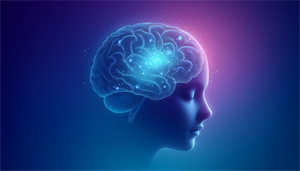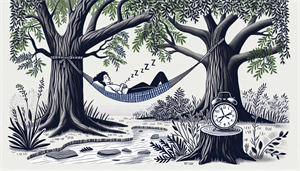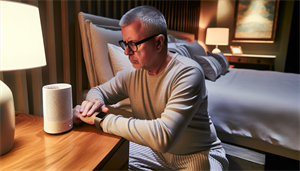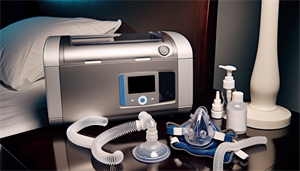Struggling to achieve a light, alert level of slumber? Learning how to sleep lighter allows you to respond more quickly to your environment and can even sharpen your memory.
Our guide dives into simple, actionable strategies that can transform your heavy sleep into a lighter, more responsive rest without overwhelming you with complexity or sales jargon. You’ll understand the science, benefits, and techniques needed to achieve the rest you desire.
Key Takeaways
-
Light sleepers have a lower arousal threshold and are easily awakened due to fewer sleep spindles and higher sensitivity to external stimuli. Genetics, sleep disorders, and sleep stages influence this characteristic.
-
Being a light sleeper may offer advantages such as improved memory and learning due to longer REM sleep, as well as heightened environmental awareness that can be beneficial for safety and experiencing lucid dreams.
-
To promote lighter sleep, one can take power naps, adjust their sleep environment to avoid deep sleep, maintain a regular sleep schedule, and consider natural remedies or technology like noise machines and sleep tracking devices.
The Science Behind Light Sleepers

Light sleepers are characterized by more than just their ability to wake up easily. The phenomenon is rooted in our sleep architecture - the structure of our sleep which is composed of non-rapid eye movement (NREM) and rapid-eye-movement (REM) sleep. Maintaining a regular sleep schedule contributes significantly to sleep quality and overall well-being.
Individuals who are light sleepers have a lower arousal threshold, meaning they require less stimulus to be awakened. This can be influenced by various factors, such as genetics and sleep disorders. Interestingly, recent theories suggest that light sleeping tendencies might also be related to different sleep stages and arousal thresholds, particularly the role of sleep spindles.
Sleep spindles, which are bursts of brain activity that happen during lighter sleep stages, significantly contribute to whether you’re a light or heavy sleeper.
Sleep Cycle and Stages
So, what exactly is a sleep cycle? A sleep cycle is a recurring process that the brain experiences during sleep, consisting of three stages of non-REM (NREM) sleep, and the REM (rapid eye movement) stage where dreaming takes place.
Deep sleep, otherwise known as Stage 3 of NREM sleep, marks the deepest sleep level, where muscles relax and waking up may cause feelings of grogginess and discomfort.
REM sleep is characterized by rapid eye movements. Additionally, there is increased brain activity during this stage. It plays a crucial role in emotional processing and memory consolidation.
A balance between light and deep sleep contributes to a restful night’s sleep. Light sleepers typically spend less time in deep sleep stages and more time in light or REM sleep, which can affect the overall quality of their sleep.
Sleep Spindles and Arousal Thresholds
You might wonder how sleep spindles and arousal thresholds play into this. Sleep spindles, the bursts of brain activity in early sleep stages, are believed to shield sleepers from being awakened by external stimuli. This means that if you have fewer sleep spindles, you’re more likely to wake up during the night, making you a lighter sleeper.
Heavy sleepers have higher arousal thresholds than light sleepers, indicating that they are less easily disrupted during sleep. This means that light sleepers are more sensitive to disturbances and are more likely to wake up. In other words, it takes less of a disturbance to wake them up. This, combined with the role of sleep spindles, explains why some people are light sleepers.
Advantages of Being a Light Sleeper

Despite your assumptions, being a light sleeper isn’t entirely disadvantageous. In fact, it could offer some unexpected benefits. For one, it can potentially enhance memory and learning by improving memory retention, recall, and consolidation during the sleep cycle.
Additionally, being a light sleeper can lead to increased environmental awareness. Because you wake up easily to small changes in the environment, you’re more likely to be alert to potential threats or necessary actions.
Memory and Learning
You may wonder how light sleeping benefits memory and learning. The key lies within the various sleep stages. Individuals who experience light sleep tend to have longer periods of REM sleep, which has been shown to enhance memory and learning.
Interrupted sleep can have negative effects on both short-term and long-term memory, as well as hinder learning efficiency due to disrupted memory consolidation and focus. This suggests that the lighter sleep patterns associated with being a light sleeper can enhance memory retention and improve recall.
Environmental Awareness
Light sleepers also tend to be more attuned to their surroundings. Light sleepers are more easily awakened by:
-
sounds
-
smells
-
light
-
movement
compared to heavy sleepers. This heightened sensory perception during sleep can be beneficial in certain situations, such as being aware of potential dangers or emergencies in the environment.
Moreover, conscious awareness during sleep can lead to lucid dreaming, where you’re aware that you’re dreaming and can control the dream. This may have therapeutic benefits for conditions like PTSD and anxiety.
Strategies for Becoming a Light Sleeper

Despite the benefits, not everyone naturally falls into the category of light sleepers. However, there are strategies you can adopt to become a light sleeper. These include taking power naps during the day, making adjustments to your sleep environment, and maintaining a regular sleep schedule.
For instance, power naps can potentially reduce the likelihood of falling into deep sleep at night, thereby promoting lighter sleep and preventing a good night’s sleep. Adjusting your sleep environment, such as keeping a TV on for background noise or using a night light, can also prevent you from falling into a deep sleep stage, thus promoting lighter sleep and hindering a better night’s sleep.
Finally, adhering to a regular sleep schedule, with consistent bedtimes and wake-up times, can enhance your body’s sleep efficiency and foster lighter sleep.
Power Naps
Power naps aren’t just for students pulling all-nighters. A quick power nap of 15 to 20 minutes can help reduce the likelihood of deep sleep at night, promoting a lighter sleep pattern.
But remember, it’s important to limit naps to 30 minutes or less to avoid interfering with your body’s innate sleep cycle. So, the next time you’re feeling sluggish in the afternoon, consider taking a power nap. It could help you become a lighter sleeper.
Sleep Environment Adjustments
Adjusting your sleep environment can also promote lighter sleep. This can range from allowing some light into the room to using a night light.
Another tip is to keep your room at a suitable temperature. The recommended room temperature for promoting high-quality light sleep is approximately 65 degrees Fahrenheit (18.3 degrees Celsius). This helps keep the environment cool and promotes better sleep.
Establishing a Consistent Sleep Schedule
Establishing a regular sleep schedule can also help. This involves going to bed and waking up at the same time every day, which helps align your sleep with your body’s natural circadian rhythms.
Establishing a consistent bedtime routine can signal to your body that it’s time to sleep, making it easier to fall asleep and stay asleep throughout the night. This can help in ensuring a more restful and rejuvenating sleep.
Natural Remedies to Encourage Light Sleep

If you prefer a more natural approach to promoting lighter sleep, there are several remedies you might want to consider. These include herbal teas, essential oils, and melatonin supplements.
These natural remedies can contribute to a more relaxed and tranquil environment, fostering lighter sleep. However, as with any supplement or remedy, it’s important to consult with a healthcare professional before starting any new regimen.
Herbal Teas
Herbal teas are well-known natural aids for encouraging lighter sleep. Certain types of tea, such as Valerian Root, Chamomile, and Lavender, are known for their soothing properties and can help promote relaxation before bedtime.
Research has shown that chamomile tea can enhance sleep quality and induce drowsiness, potentially aiding in achieving a lighter sleep. To maximize the sleep benefits, consider consuming herbal teas at least 2 to 3 times a day, especially 2 to 3 hours before bedtime.
Essential Oils
Essential oils can also be an effective aid in promoting lighter sleep. Lavender, for example, has been used for centuries to promote a sense of calmness, contributing to lighter sleep.
Other beneficial oils include Ylang Ylang, Bergamot, and Chamomile. These can be used in a diffuser, added to a bath, or applied topically to the skin for rapid absorption.
Melatonin Supplements
Melatonin supplements can also prove beneficial. Melatonin is a hormone naturally produced by our bodies, and it helps regulate sleep patterns. It is typically released in the evening in response to darkness. Taking a supplement can increase melatonin levels in the body, helping to regulate sleep patterns and encourage lighter sleep.
However, it’s important to consult with a healthcare professional before starting to take melatonin supplements, as excessive intake can decrease both the duration and quality of sleep.
Sleep Technology for Light Sleepers

In the era of digital advancements, technology can assist in fostering lighter sleep. Noise machines, earplugs, and sleep tracking devices are just a few examples of the sleep technology available to light sleepers.
Such devices contribute to a more sleep-friendly environment, block unwanted noise, and offer useful insights into your sleep patterns.
Noise Machines and Earplugs
A noise machine is a device designed to generate continuous background noise, effectively masking external disturbances and sudden sound variations. This can help light sleepers achieve a more uninterrupted and restful sleep at night.
Earplugs, on the other hand, can provide significant reduction in distracting sounds, leading to a quieter sleep environment and potentially enhancing sleep quality for light sleepers.
Sleep Tracking Devices
Sleep tracking devices can provide useful insights into your sleep patterns. These devices work by monitoring parameters like movement, heart rate, and breathing rate, providing data on sleep quantity and quality.
These insights can help light sleepers make necessary adjustments to their sleep habits and environment. Recommended devices for light sleepers include the Fitbit Inspire 2 and the Oura Ring Horizon.
When to Consult a Doctor
Despite the potential benefits of being a light sleeper, it’s crucial to acknowledge when professional medical consultation becomes necessary, especially if you have trouble falling asleep. Symptoms such as:
-
experiencing fatigue during the day
-
having difficulty concentrating
-
feeling irritable
-
experiencing excessive anxiety
can be signs that it’s time to consult a healthcare professional.
Keep in mind that light sleeping could occasionally indicate an underlying sleep disorder like obstructive sleep apnea or insomnia. If you suspect that you might have a sleep disorder, it’s important to seek medical advice.
Recognizing Symptoms
Identifying poor sleep quality symptoms can pave the way to seeking necessary help. Common symptoms include daytime sleepiness, trouble focusing, slowed reaction times, and headaches.
If you’re experiencing these symptoms, or if your mood and emotional well-being are affected, it might be time to seek medical advice.
Managing Sleep Disorders
If you’re diagnosed with a sleep disorder, there are ways to manage it and improve your sleep quality. These range from cognitive behavioral therapy to lifestyle adjustments like improving sleep hygiene practices and wearing an eye mask.
Bear in mind that addressing a sleep disorder can potentially enhance both your sleep quality and overall life quality.
Summary
In conclusion, being a light sleeper isn’t a curse. It can have its advantages, such as enhanced memory and increased environmental awareness. With the right strategies and tools, you can also manage and even enhance your light sleeping tendencies. From incorporating power naps and adjusting your sleep environment to using natural remedies and sleep technology, there are various ways to improve your quality of sleep. And remember, if you’re experiencing symptoms of poor sleep quality or suspect you might have a sleep disorder, don’t hesitate to seek medical advice.
Frequently Asked Questions
Can you train yourself to sleep lighter?
Yes, you can train yourself to sleep lighter by setting a regular sleep schedule and sticking to it consistently, even on weekends.
How do I stop being a heavy sleeper?
To stop being a heavy sleeper, establish a regular sleep schedule by going to bed and waking up at the same time every day, even on weekends. You can use tools like the Sleep Cycle app to help you achieve this.
How did I become a light sleeper?
You may be a light sleeper due to genetics, an underlying sleep disorder, or aspects of your bedroom environment. Light sleepers tend to wake up to small disturbances, such as a car passing by or a street lamp turning on.
Rem sleep is?
REM sleep is the stage of sleep where most dreams occur and is characterized by rapid eye movements and brain activity similar to being awake. It makes up about 25% of total sleep time.
What is the science behind light sleepers?
Light sleepers have a lower arousal threshold and are more easily awakened, which can be influenced by genetics and sleep disorders. Sleep spindles, bursts of brain activity during early sleep stages, are thought to protect them from waking up easily.


